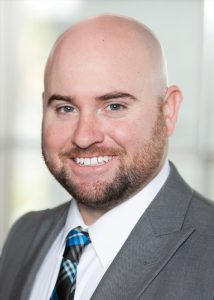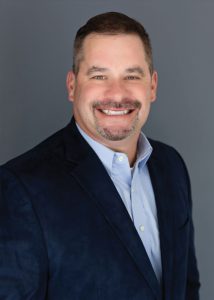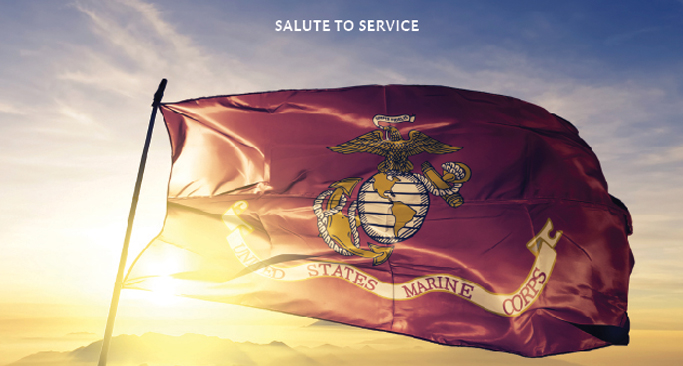Two Marines share military experiences and insight
on veterans working in the industry
By Christopher W. Cook
Founded this month back in 1775, the United States Marine Corps is but one of the eight uniformed services in the country. Its motto: Semper fidelis—Latin for “always faithful.”
By itself, this is a great motto to follow, whether it’s faithfulness to one’s family, comrades, country or clients. In this month’s “Salute to Service,” we’ll hear from two Marines who took their experiences from their military days to their careers in the insurance industry.
Corporal Liberty
Like several individuals who graduated from college around The Great Recession, Tim Liberty, director of risk mitigation services at Baldwin Krystyn Sherman Partners, stumbled into the insurance industry. After earning a degree in political science from Northeastern Illinois University in 2010, Liberty, “applied for every job I could. I was fortunate enough that Liberty Mutual took a chance on me and gave me an opportunity as a work comp adjuster,” he says.
After three years with the firm, Liberty moved to his current role. But before his days in the college classroom and arrival in the insurance industry, he served in the United States Marine Corps.
“I served in the First Battalion 7th Marine Regiment as an Infantryman. I was stationed at 29 Palms in San Bernardino, California, and later deployed to Iraq where I was an Assistant Patrol Leader for a Humvee section,” Liberty says.
“We lived in a commandeered basketball gym and patrolled four towns multiple times a day; we were a quick reaction force while not patrolling. Most of the time we were trying to win the hearts and minds of the people by building relationships with the local leaders, and trying not to get blown up.”
Although chance brought him to the insurance industry, Liberty’s experiences while serving prepared him for his current position.

“There was a trust from leadership that we were doing the right thing. I
hope hiring managers consider that and look at veterans as people
who often had to be creative and trust their teammates.”
—Tim Liberty
Director, Risk Mitigation Services
Baldwin Krystyn Sherman Partners
“There is a saying that no plan survives the first enemy encounter,” he says. “When IEDs (improvised explosive devices) go off or shots get fired, you have to think on your feet and adapt and overcome. That’s what the military gave to me. I work in claims, which can be stressful. You generally have a plan to get a claim resolved, but something always happens and you have to adapt as new facts arise.
“Also, there aren’t many friendly conversations in the Marine Corps when it comes to getting feedback. It normally comes with a hand in your face and a slew of vulgarities. So, I handle difficult conversations with clients pretty well nowadays.”
The diversity in the military also provided Liberty with the insight into how people from different backgrounds think.
Sergeant Howell
Scott Howell, owner of iPROTECT Insurance & Financial Services, and co-host of The Insurance Guys Podcast, was told from an early age that he’d do well as an insurance agent.
“Like most young people, I brushed those comments off, until the mortgage crisis of 2008,” Howell says. “After getting punched in the teeth, the insurance business sounded a lot more interesting. I began my career in insurance when I was 35; it was a long journey to say the least, but here we are.”
After graduating with a degree in business, management and marketing from Birmingham-Southern College in 1992, Howell enlisted in the Marine Corps.
“Much like insurance, I kind of fell into the Marine Corps, too, after being seen and approached by a Marine Corps recruiter while visiting a girlfriend who worked at a tanning salon next to the Marine Corps Recruiting Office,” Howell says. “Over the next four years, I was honored to work with and beside some ‘Storybook’ Marines, traveled the world and saw and did things that sometimes I still can’t believe.”
Howell began his service in London, England, providing security detachment at the headquarters for the Naval Activity in Europe. “My biggest accomplishment was being one of only a handful of U.S. citizens to graduate from both Parris Island, South Carolina, and the British Royal Marine Bootcamp in Lympstone,” Howell says.
After Europe, Howell served with the 3rd Battalion 5th Marine Regiment (nicknamed Darkhorse) in both San Clemente, California, and Okinawa, Japan, as an 0351 Dragon Gunner and performing Demolitions. During this time, Howell served on the U.S.S. Belleau Wood (LHA-3) in the Pacific Ocean for four months, participated in cold weather training in Iceland, and participated in the Cobra Gold training event in Thailand.
“You name it, I did it,” Howell says. “And this is why I had to have a full hip replacement in May of this year.”
Through his military experiences, Howell learned leadership, discipline, and working together as a team. “More than anything, for me, it was just growing up. I matured a lot in the Marine Corps, and I needed that,” he says.

“[T]he men and women retiring at age 45 to 50 would be great
in this industry and should take a hard look at the myriad of
opportunities when making decisions on what to do after they throw their boots over the power line.”
—Scott Howell
Owner
iPROTECT Insurance & Financial Services
A job for veterans
When it comes to veterans working in insurance, Liberty informs industry leaders that “there is a misconception about the military as some people see troops as mindless trigger pullers who do what their command says. That’s not the case from my experience.
“We were always pretty far away from our base and had to make decisions on the fly while following the commander’s intent. There was a trust from leadership that we were doing the right thing. I hope hiring managers consider that and look at veterans as people who often had to be creative and trust their teammates.”
Howell believes that insurance would be a good fit, particularly for older veterans. “I have noticed more retiring veterans getting into the industry as agency owners, producers and adjusters. I think the men and women retiring at age 45 to 50 would be great in this industry and should take a hard look at the myriad of opportunities when making decisions on what to do after they throw their boots over the power line,” he concludes.






